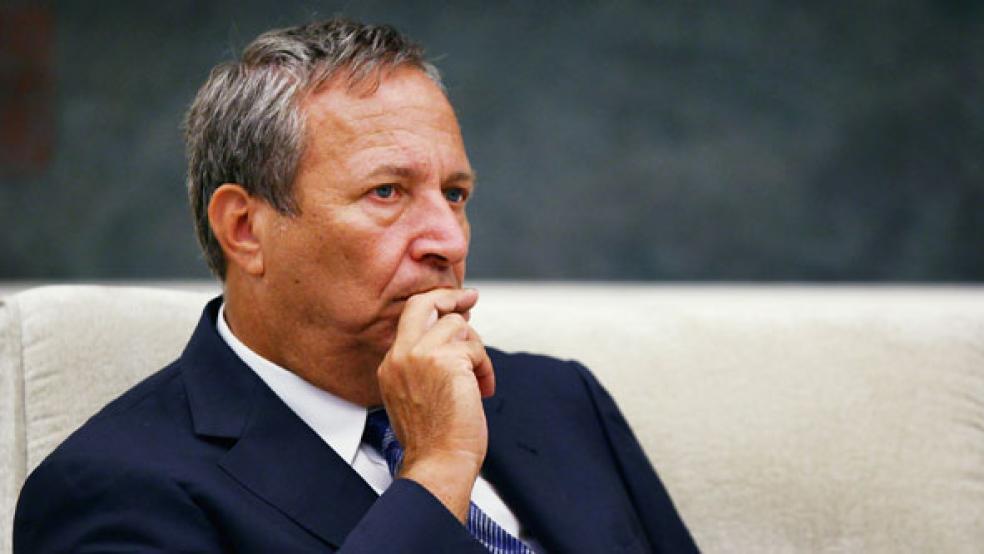Despite the effects of the sequester and a two-percentage point boost in the payroll tax early this year, former Treasury Secretary Larry Summers says he’s bullish on the economy and expects a growth spurt of three percent or more on an annualized basis by year’s end.
“I think there are big headwinds from the sequester and the payroll tax increase are likely to constrain growth over the next several quarters, juxtaposed with substantial growth benefits from the turn in housing and from the increased investment in energy and the wealth effects of a stronger stock market and, you know, generally, the repair of consumer balance sheets,” Summers said. “So I think they are going to struggle with each other. Growth for the next couple of quarters is likely to remain in the general range that it has been.”
During a breakfast meeting sponsored by the Wall Street Journal on Tuesday, he also said that those adverse forces are being offset by the sharp improvement in housing, boom times in domestic energy production and a surprisingly strong stock market.
“I would expect … as we get towards the end of the year, you will see a significant acceleration in growth, towards or perhaps beyond going into next year – 3 percent, as the economy is no longer absorbing substantial further blows from fiscal policy and the growth benefits accelerate from the factors that I cited,” he added.
Summers, the Harvard economics professor who became a major force in Washington as President Bill Clinton’s Treasury Secretary and most recently as President Obama’s chairman of the Council of Economic Advisers, has had a mixed record as a forecaster. That was especially true during his stint as Obama’s senior economic adviser at the height of the Great Recession, when he had to defend what proved to be overly optimistic estimates of the impact of the president’s stimulus package on unemployment and the economy.
Today, Summers offered up a forecast only slightly more upbeat than those of the non-partisan Congressional Budget Office and some blue chip forecasters.
The CBO expects economic activity to expand slowly this year, with real GDP growing by just 1.4 percent. After the economy adjusts this year to fiscal tightening, “underlying economic factors will lead to more rapid growth,” according to CBO. The agency projects 3.4 percent growth in 2014 and an average of 3.6 percent a year from 2015 through 2018.
Asked if he thought the sequester has done more harm than good to the economy – as many critics of the cuts contend – Summers said he views it as “a wash,” with whatever achievements made in debt reduction offset by a slowing in economic growth and less tax revenue coming in. “I don’t want to push the claim that it [the sequester] was literally counter-productive with respect to the debt-to-GDP ratio,” he said. “It might be that it turns out to be constructive …. But with an overall-cost-benefit test, we would have been much better off with a kind of expenditure reduction that was back-loaded rather than front-loaded.”
Summers came to D.C. today to testify before the Senate Budget Committee on the fiscal and economic effects of austerity policies. He argues that the government’s laser-like focus on the deficit since the end of 2009 has heavily contributed to a jobless recovery. “Were we to focus on employment and growth, we would be highly likely to make more progress on reducing the future burden of the debt than when we focus on the deficit.”
Summers added, “The deficit challenge remains the challenge for the country, but addressing it too rapidly is not wise.” He said that in its haste to reduce spending, Congress may actually be thwarting its goal of spurring economic growth and reducing the debt-to-GDP ratio. Echoing the views of the Obama administration, Summers said Congress should invest more heavily now in infrastructure, research and development, education and other programs that will strengthen the economy over time, while postponing cuts and other austerity measures for several more years.
“In [the] short term, we brought the deficit down faster than would have been optimal, and as a consequence, we’ve suffered slower growth than we needed to suffer,” he said. “And the acceleration of recovery has been postponed more than it needed to be postponed.”
Deficit fever, meanwhile, is on the wane. After four consecutive years of $1 trillion budget deficits, the government is on target to shrink this year’s deficit to $642 billion, according to the latest CBO projection—a project that includes the two demons of austerity: tax hikes and budget cuts in the form of the sequester. That would make it the smallest budget shortfall since 2008. Relative to the size of the economy, the deficit this year, at 4.0 percent of GDP, will be less than half as large as the shortfall in 2009, which was 10.1 percent of GDP.





